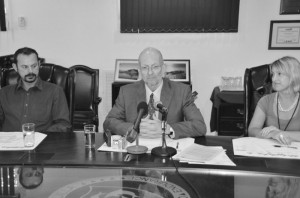
At a press conference on Tuesday, February 13, Governor Alistair Harrison took questions on various matters from media representatives. The questions and answers touched on such matters as the 2013 Budget which is still to be approved in London; the Framework for Fiscal Responsibility still to be agreed by both the Anguilla and UK Governments; crime; and referendum and independence. There were also questions and answers on Cap Juluca and Malliouhana.
Replying to questions about the budget,the Governor told reporters that discussions were still continuing between the Government of Anguilla and the Foreign Office. He said it would not be a very satisfactory situation for the 2013 budget to run over month by month as was the case in 2012. He thought it would be goodto have the 2013 budget agreed as soon as possible and that a communication – which he did not wish to pre-empt – should be sent fairly soon to the Chief Minister.
He said there were three issues to be addressed: ensure that there was an agreement on the 2013 budget which he thought was a good budget but with one or two issues to be resolved; agree on the Framework for Fiscal Responsibility or the Framework for Sustainable Development (as it may be called) which is in process of negotiation; and find a way of dealing with Anguilla’s need to modernise its infrastructure and to sort out capital spending.
“The Framework for Fiscal Responsibility would establish a capital development fund,” he continued. “That is probably the best way forward to ensure that fluctuations in capital spending don’t distort each annual budget. If we can reach agreement on all of those things, then I think the way forward should be clear.”
On Cap Juluca, where the operations are still problematic, and a number of workers have been sent home, the Governor said: “I don’t want to talk in detail about Cap Juluca because obviously it is a matter for the elected Ministers… But of course I am dismayed, and I am sure that if the elected Ministers were here they would also be very dismayed at the news from Cap Juluca.
“I can say that it is an issue that Executive Council has been working on solemny for a long time and the present situation, since the change of control early last year, is an issue on which the Chief Minister and I have absolutely agreed we want a long-term future for Cap Juluca; a resolution to the fractured ownership; a resolution to the legal disputes that have dogged the resort. We want it for a number of reasons: firstly, because it provides employment for so many Anguillians; secondly, because it is in many ways the iconic resort of Anguilla and Anguilla’s tourist industry. It is very bound up with it. And thirdly, because of the contribution it can make – and indeed has made over the years – to the long-term development of Anguilla and particularly the tourist industry…
“The situation is extremely complex and I do very much sympathise with the difficulties of those who were working with Cap Juluca and are being let go.”
Answering a question about reports that the progress of the sale- arrangement of Malliouhana Hotel between the new investors and the owners was being was held up by another interest, the Governor responded:
“You need to address the question to the present owners of Malliouhana and the purchasers. That’s a private transaction. As you know, the Government has signed a Memorandum of Understanding with the new purchasers. Again, it is a matter for Ministers but I can say, without hesitation, that that is being handled with great despatch and with great responsibility both by the elected members of Executive Council and by the public servants on the Investment Committee. There is no doubt that Government at every level has done its part to facilitatethe sale of Malliouhana.
“It is very important that the oldest big resort should be reopened. It seems that it could only happen under the new ownership… It’s been a long process; there have been lots of starts and stops along the way with various people expressing interest and then it is not happening. We wish it well and I am sure that would be the view of the Chief Minister and the other Ministers as well.But matters that are essentially a private issue are obviously for the purchasers and the vendors to sort out themselves.”
On crime, Governor Harrison said that he very much supported the view of the Commissioner of Police that the resources of the Royal Anguilla Police Force were best ones to control crime in Anguilla. “The RAPF has an extremely good record of clearing up crime which would be the envy of many larger police forces,” he went on. “We remain, despite it all, a low crime jurisdiction, but equally very worried by the fact that crime, although still not high, is rising and that there have been a couple of incidents recently involving the tourism industry which have got a lot of publicity on Trip Adviser and elsewhere.
“None of this is doing Anguilla’s reputation, as a haven for tourism, any good. We don’t want to become like some other Caribbean islands, where tourists go, but are effectively locked upwithin their own inclusive resorts and do not really travel around. We want to be the sort of island where tourists feel safe to come, stay at one of the big resorts, or the small resorts, and to travel around the island sampling the beaches, restaurants and the hospitality of its people.”
He spoke about looking at further strengthening the police in manpower and technical resources, later on, in addition to what had already been agreed by Executive Council.
On matters of a referendum and independence, the Governor said: “The British Government absolutely recognises the right of the people of Anguilla – and indeed of all the Overseas Territories – to determine their own future. If the people of Anguilla were to vote for independence – it would probably constitute a referendum – then the British Government would absolutely recognise the wish of the people of Anguilla and indeed of all the Overseas Territories to determine their own future and would facilitate the path to independence.
“Equally, self-determination works the other way. It cannot be right for the views of the Falklanders or the people of Anguilla to be ignored. It couldn’t be just a decision of the House of Assembly, for example, to take Anguilla to independence. It would have to have the full-hearted consent of all the people of Anguilla. If those who are clamouring forindependenceshouldpersuade the Chief Minister or ExecutiveCouncil to call for a referendum, I have been instructed to say veryclearly, on many occasions, that the British Government would recognise theresults of sucha referendum.”








